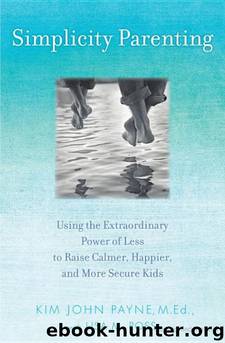Simplicity Parenting by Kim John Payne & Lisa M. Ross

Author:Kim John Payne & Lisa M. Ross [Payne, Kim John & Ross, Lisa M.]
Language: eng
Format: epub
Tags: Family & Relationships, Parenting, General, Life Stages, School Age
ISBN: 9780345516985
Google: wgOlqYssz7AC
Publisher: Random House Publishing Group
Published: 2009-08-24T16:00:00+00:00
Family Dinner
In my years as a Waldorf teacher I noticed a curious phenomenon. A regular part of the kindergartner’s day is the preparation of a snack. This process might include chopping vegetables for soup, peeling apples, or kneading dough for loaves of bread. Invariably parents would be dumbfounded to learn that at school their son or daughter ate whatever the snack was—vegetable soup or a warm porridge—with gusto.
“Impossible! Taylor only eats two things: bow-tie pasta with butter, or waffles.” Vegetable soup? How could this be? Throughout the year, parents would figure ways to visit the classroom at snack time, looking for the trick, the sleight of hand that would explain this miracle. They would look at the kindergarten teachers searchingly: “There is something magical about her … but what can it be?”
The magic, it turns out, is in the process. Children who’ve had a role in preparing a meal assume ownership of it. More simply: When children make the food, they’re less likely to throw it, or refuse it. In the wonderful world of the Waldorf kindergarten, “snack” is not just something to eat, it is an event. There is reverence associated with the whole process: the preparation, eating, and the cleaning up afterward. Everyone is involved.
Social scientists have scrutinized the importance of “the family dinner” since the 1980s, when it was clear that this once-sacred ritual was on the endangered list. Numerous years and studies were devoted to chicken-and-egg questions: Was it the quality of the time together that determined the effects? Were kids who did better in school more likely to come from families who ate dinner together, or was it the eating together as a family that influenced the kids’ better grades?
The answer, again, is in the process, not the particulars. Tonight’s dinner may not be a gourmet triumph, the conversation might ramble, and uninvited guests may join the family gathering: bickering, or underlying tensions from the day. Process, it turns out, allows for bad nights, bad moods, even (heaven forbid) bad food. Process (or rhythm) braids those particulars, with the golden moments, too, into a strong, unifying bond. This is what we do together, and mean to one another, good day, good meal, or bad.
Download
This site does not store any files on its server. We only index and link to content provided by other sites. Please contact the content providers to delete copyright contents if any and email us, we'll remove relevant links or contents immediately.
| Early Childhood | Parenting Boys |
| Parenting Girls | School-Age Children |
| Single Parents | Teenagers |
The Lost Art of Listening by Michael P. Nichols(7506)
Rich Dad Poor Dad by Robert T. Kiyosaki(6632)
We Need to Talk by Celeste Headlee(5615)
I Love You But I Don't Trust You by Mira Kirshenbaum(3876)
The Complete Idiot's Guide to Coping With Difficult People by Arlene Uhl(3149)
Rich Dad Poor Dad: What The Rich Teach Their Kids About Money - That The Poor And Middle Class Do Not! by Robert T. Kiyosaki(2958)
A Burst of Light by Audre Lorde(2607)
The Book You Wish Your Parents Had Read (and Your Children Will Be Glad That You Did) by Philippa Perry(2528)
Dealing with People You Can't Stand by Dr. Rick Brinkman(2460)
Life Hacks by Dan Marshall(2456)
An Odyssey by Daniel Mendelsohn(2307)
The Expectant Father by Armin A. Brott & Jennifer Ash(2273)
Teach Your Child How to Think by Edward De Bono(2159)
No Time to Say Goodbye(2117)
What I Need by J. Daniels(2081)
The 7 Habits Of Highly Effective Teens by Covey Sean(2080)
The Out-of-Sync Child by Carol Stock Kranowitz(2054)
The Anxious Generation by Jonathan Haidt(2050)
I Don't Belong to You by Keke Palmer(2005)
